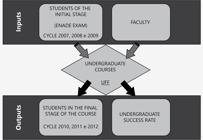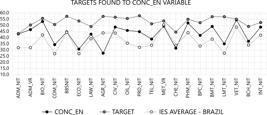Abstract
The study aims to determine the efficiency of undergraduate courses associated with a Brazilian Federal University contributing to the discussion about performance evaluation models in the context of Brazilian Higher Education. Data envelopment analysis (DEA) is used to obtain the efficiency indexes that reflect the ability of the courses to add knowledge to students during the academic training period. Therefore, DEA-BCC model is applied in two different scenarios. In the first one, undergraduate courses were evaluated as a whole, to compare them, regardless of their differences. In the second scenario, the profile differences of each course are respected by grouping these units. Thus, the findings showed that 10 of the 31 units were considered efficient in Scenario 1, that is, they are courses that have provided greater capacity to add knowledge to the students in the considered period. For the inefficient units, some variables that should be improved were analyzed. In Scenario 2, when the courses are grouped by area, the peers that serve as benchmarks for the inefficient courses were identified.
Higher Education; Undergraduate Courses; Performance Evaluation; DEA

 Thumbnail
Thumbnail
 Thumbnail
Thumbnail
 Thumbnail
Thumbnail
 Thumbnail
Thumbnail
 Thumbnail
Thumbnail
 Thumbnail
Thumbnail
 Source: Adapted from Gomes Júnior (2010)
Source: Adapted from Gomes Júnior (2010)
 Source: Adapted from Gomes Júnior (2010)
Source: Adapted from Gomes Júnior (2010)
 Source: Authors (2019)
Source: Authors (2019)
 Source: Authors (2019)
Source: Authors (2019)
 Source: Authors (2019)
Source: Authors (2019)
 Source: Authors (2019)
Source: Authors (2019)